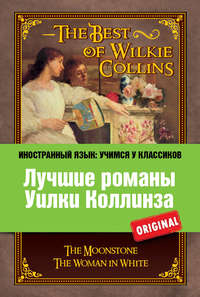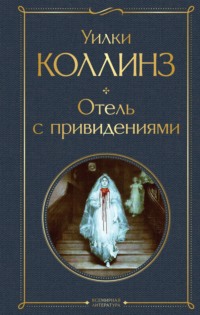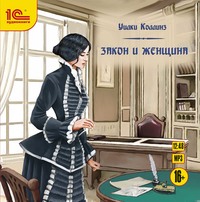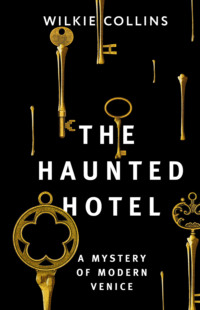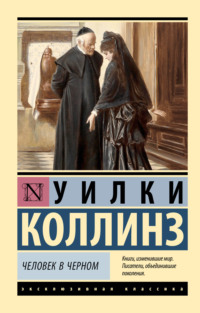
Полная версия
Man and Wife
It was plain to Sir Patrick (to whom both ladies had opened their hearts, at separate interviews) that his sister-in-law, in one way, and his niece in another, were equally likely—if not duly restrained—to plunge headlong into acts of indiscretion which might lead to very undesirable results. A man in authority was sorely needed at Windygates that afternoon—and Sir Patrick was fain to acknowledge that he was the man.
"Much is to be said for, and much is to be said against a single life," thought the old gentleman, walking up and down the sequestered garden-path to which he had retired, and applying himself at shorter intervals than usual to the knob of his ivory cane. "This, however, is, I take it, certain. A man's married friends can't prevent him from leading the life of a bachelor, if he pleases. But they can, and do, take devilish good care that he sha'n't enjoy it!"
Sir Patrick's meditations were interrupted by the appearance of a servant, previously instructed to keep him informed of the progress of events at the house.
"They're all gone, Sir Patrick," said the man.
"That's a comfort, Simpson. We have no visitors to deal with now, except the visitors who are staying in the house?"
"None, Sir Patrick."
"They're all gentlemen, are they not?"
"Yes, Sir Patrick."
"That's another comfort, Simpson. Very good. I'll see Lady Lundie first."
Does any other form of human resolution approach the firmness of a woman who is bent on discovering the frailties of another woman whom she hates? You may move rocks, under a given set of circumstances. But here is a delicate being in petticoats, who shrieks if a spider drops on her neck, and shudders if you approach her after having eaten an onion. Can you move her, under a given set of circumstances, as set forth above? Not you!
Sir Patrick found her ladyship instituting her inquiries on the same admirably exhaustive system which is pursued, in cases of disappearance, by the police. Who was the last witness who had seen the missing person? Who was the last servant who had seen Anne Silvester? Begin with the men-servants, from the butler at the top to the stable boy at the bottom. Go on with the women-servants, from the cook in all her glory to the small female child who weeds the garden. Lady Lundie had cross-examined her way downward as far as the page, when Sir Patrick joined her.
"My dear lady! pardon me for reminding you again, that this is a free country, and that you have no claim whatever to investigate Miss Silvester's proceedings after she has left your house."
Lady Lundie raised her eyes, devotionally, to the ceiling. She looked like a martyr to duty. If you had seen her ladyship at that moment, you would have said yourself, "A martyr to duty."
"No, Sir Patrick! As a Christian woman, that is not my way of looking at it. This unhappy person has lived under my roof. This unhappy person has been the companion of Blanche. I am responsible—I am, in a manner, morally responsible. I would give the world to be able to dismiss it as you do. But no! I must be satisfied that she is married. In the interests of propriety. For the quieting of my own conscience. Before I lay my head on my pillow to-night, Sir Patrick—before I lay my head on my pillow to-night!"
"One word, Lady Lundie—"
"No!" repeated her ladyship, with the most pathetic gentleness. "You are right, I dare say, from the worldly point of view. I can't take the worldly point of view. The worldly point of view hurts me." She turned, with impressive gravity, to the page. "You know where you will go, Jonathan, if you tell lies!"
Jonathan was lazy, Jonathan was pimply, Jonathan was fat—but Jonathan was orthodox. He answered that he did know; and, what is more, he mentioned the place.
Sir Patrick saw that further opposition on his part, at that moment, would be worse than useless. He wisely determined to wait, before he interfered again, until Lady Lundie had thoroughly exhausted herself and her inquiries. At the same time—as it was impossible, in the present state of her ladyship's temper, to provide against what might happen if the inquiries after Anne unluckily proved successful—he decided on taking measures to clear the house of the guests (in the interests of all parties) for the next four-and-twenty hours.
"I only want to ask you a question, Lady Lundie," he resumed. "The position of the gentlemen who are staying here is not a very pleasant one while all this is going on. If you had been content to let the matter pass without notice, we should have done very well. As things are, don't you think it will be more convenient to every body if I relieve you of the responsibility of entertaining your guests?"
"As head of the family?" stipulated Lady Lundie.
"As head of the family!" answered Sir Patrick.
"I gratefully accept the proposal," said Lady Lundie.
"I beg you won't mention it," rejoined Sir Patrick.
He quitted the room, leaving Jonathan under examination. He and his brother (the late Sir Thomas) had chosen widely different paths in life, and had seen but little of each other since the time when they had been boys. Sir Patrick's recollections (on leaving Lady Lundie) appeared to have taken him back to that time, and to have inspired him with a certain tenderness for his brother's memory. He shook his head, and sighed a sad little sigh. "Poor Tom!" he said to himself, softly, after he had shut the door on his brother's widow. "Poor Tom!"
On crossing the hall, he stopped the first servant he met, to inquire after Blanche. Miss Blanche was quiet, up stairs, closeted with her maid in her own room. "Quiet?" thought Sir Patrick. "That's a bad sign. I shall hear more of my niece."
Pending that event, the next thing to do was to find the guests. Unerring instinct led Sir Patrick to the billiard-room. There he found them, in solemn conclave assembled, wondering what they had better do. Sir Patrick put them all at their ease in two minutes.
"What do you say to a day's shooting to-morrow?" he asked.
Every man present—sportsman or not—said yes.
"You can start from this house," pursued Sir Patrick; "or you can start from a shooting-cottage which is on the Windygates property—among the woods, on the other side of the moor. The weather looks pretty well settled (for Scotland), and there are plenty of horses in the stables. It is useless to conceal from you, gentlemen, that events have taken a certain unexpected turn in my sister-in-law's family circle. You will be equally Lady Lundie's guests, whether you choose the cottage or the house. For the next twenty-four hours (let us say)—which shall it be?"
Every body—with or without rheumatism—answered "the cottage."
"Very good," pursued Sir Patrick, "It is arranged to ride over to the shooting-cottage this evening, and to try the moor, on that side, the first thing in the morning. If events here will allow me, I shall be delighted to accompany you, and do the honors as well as I can. If not, I am sure you will accept my apologies for to-night, and permit Lady Lundie's steward to see to your comfort in my place."
Adopted unanimously. Sir Patrick left the guests to their billiards, and went out to give the necessary orders at the stables.
In the mean time Blanche remained portentously quiet in the upper regions of the house; while Lady Lundie steadily pursued her inquiries down stairs. She got on from Jonathan (last of the males, indoors) to the coachman (first of the males, out-of-doors), and dug down, man by man, through that new stratum, until she struck the stable-boy at the bottom. Not an atom of information having been extracted in the house or out of the house, from man or boy, her ladyship fell back on the women next. She pulled the bell, and summoned the cook—Hester Dethridge.
A very remarkable-looking person entered the room.
Elderly and quiet; scrupulously clean; eminently respectable; her gray hair neat and smooth under her modest white cap; her eyes, set deep in their orbits, looking straight at any person who spoke to her—here, at a first view, was a steady, trust-worthy woman. Here also on closer inspection, was a woman with the seal of some terrible past suffering set on her for the rest of her life. You felt it, rather than saw it, in the look of immovable endurance which underlain her expression—in the deathlike tranquillity which never disappeared from her manner. Her story was a sad one—so far as it was known. She had entered Lady Lundie's service at the period of Lady Lundie's marriage to Sir Thomas. Her character (given by the clergyman of her parish) described her as having been married to an inveterate drunkard, and as having suffered unutterably during her husband's lifetime. There were drawbacks to engaging her, now that she was a widow. On one of the many occasions on which her husband had personally ill-treated her, he had struck her a blow which had produced very remarkable nervous results. She had lain insensible many days together, and had recovered with the total loss of her speech. In addition to this objection, she was odd, at times, in her manner; and she made it a condition of accepting any situation, that she should be privileged to sleep in a room by herself As a set-off against all this, it was to be said, on the other side of the question, that she was sober; rigidly honest in all her dealings; and one of the best cooks in England. In consideration of this last merit, the late Sir Thomas had decided on giving her a trial, and had discovered that he had never dined in his life as he dined when Hester Dethridge was at the head of his kitchen. She remained after his death in his widow's service. Lady Lundie was far from liking her. An unpleasant suspicion attached to the cook, which Sir Thomas had over-looked, but which persons less sensible of the immense importance of dining well could not fail to regard as a serious objection to her. Medical men, consulted about her case discovered certain physiological anomalies in it which led them to suspect the woman of feigning dumbness, for some reason best known to herself. She obstinately declined to learn the deaf and dumb alphabet—on the ground that dumbness was not associated with deafness in her case. Stratagems were invented (seeing that she really did possess the use of her ears) to entrap her into also using her speech, and failed. Efforts were made to induce her to answer questions relating to her past life in her husband's time. She flatly declined to reply to them, one and all. At certain intervals, strange impulses to get a holiday away from the house appeared to seize her. If she was resisted, she passively declined to do her work. If she was threatened with dismissal, she impenetrably bowed her head, as much as to say, "Give me the word, and I go." Over and over again, Lady Lundie had decided, naturally enough, on no longer keeping such a servant as this; but she had never yet carried the decision to execution. A cook who is a perfect mistress of her art, who asks for no perquisites, who allows no waste, who never quarrels with the other servants, who drinks nothing stronger than tea, who is to be trusted with untold gold—is not a cook easily replaced. In this mortal life we put up with many persons and things, as Lady Lundie put up with her cook. The woman lived, as it were, on the brink of dismissal—but thus far the woman kept her place—getting her holidays when she asked for them (which, to do her justice, was not often) and sleeping always (go where she might with the family) with a locked door, in a room by herself.
Hester Dethridge advanced slowly to the table at which Lady Lundie was sitting. A slate and pencil hung at her side, which she used for making such replies as were not to be expressed by a gesture or by a motion of the head. She took up the slate and pencil, and waited with stony submission for her mistress to begin.
Lady Lundie opened the proceedings with the regular formula of inquiry which she had used with all the other servants,
"Do you know that Miss Silvester has left the house?"
The cook nodded her head affirmatively.
"Do you know at what time she left it?"
Another affirmative reply. The first which Lady Lundie had received to that question yet. She eagerly went on to the next inquiry.
"Have you seen her since she left the house?"
A third affirmative reply.
"Where?"
Hester Dethridge wrote slowly on the slate, in singularly firm upright characters for a woman in her position of life, these words:
"On the road that leads to the railway. Nigh to Mistress Chew's Farm."
"What did you want at Chew's Farm?"
Hester Dethridge wrote: "I wanted eggs for the kitchen, and a breath of fresh air for myself."
"Did Miss Silvester see you?"
A negative shake of the head.
"Did she take the turning that leads to the railway?"
Another negative shake of the head.
"She went on, toward the moor?"
An affirmative reply.
"What did she do when she got to the moor?"
Hester Dethridge wrote: "She took the footpath which leads to Craig Fernie."
Lady Lundie rose excitedly to her feet. There was but one place that a stranger could go to at Craig Fernie. "The inn!" exclaimed her ladyship. "She has gone to the inn!"
Hester Dethridge waited immovably. Lady Lundie put a last precautionary question, in these words:
"Have you reported what you have seen to any body else?"
An affirmative reply. Lady Lundie had not bargained for that. Hester Dethridge (she thought) must surely have misunderstood her.
"Do you mean that you have told somebody else what you have just told me?"
Another affirmative reply.
"A person who questioned you, as I have done?"
A third affirmative reply.
"Who was it?"
Hester Dethridge wrote on her slate: "Miss Blanche."
Lady Lundie stepped back, staggered by the discovery that Blanche's resolution to trace Anne Silvester was, to all appearance, as firmly settled as her own. Her step-daughter was keeping her own counsel, and acting on her own responsibility—her step-daughter might be an awkward obstacle in the way. The manner in which Anne had left the house had mortally offended Lady Lundie. An inveterately vindictive woman, she had resolved to discover whatever compromising elements might exist in the governess's secret, and to make them public property (from a paramount sense of duty, of course) among her own circle of friends. But to do this—with Blanche acting (as might certainly be anticipated) in direct opposition to her, and openly espousing Miss Silvester's interests—was manifestly impossible.
The first thing to be done—and that instantly—was to inform Blanche that she was discovered, and to forbid her to stir in the matter.
Lady Lundie rang the bell twice—thus intimating, according to the laws of the household, that she required the attendance of her own maid. She then turned to the cook—still waiting her pleasure, with stony composure, slate in hand.
"You have done wrong," said her ladyship, severely. "I am your mistress. You are bound to answer your mistress—"
Hester Dethridge bowed her head, in icy acknowledgment of the principle laid down—so far.
The bow was an interruption. Lady Lundie resented it.
"But Miss Blanche is not your mistress," she went on, sternly. "You are very much to blame for answering Miss Blanche's inquiries about Miss Silvester."
Hester Dethridge, perfectly unmoved, wrote her justification on her slate, in two stiff sentences: "I had no orders not to answer. I keep nobody's secrets but my own."
That reply settled the question of the cook's dismissal—the question which had been pending for months past.
"You are an insolent woman! I have borne with you long enough—I will bear with you no longer. When your month is up, you go!"
In those words Lady Lundie dismissed Hester Dethridge from her service.
Not the slightest change passed over the sinister tranquillity of the cook. She bowed her head again, in acknowledgment of the sentence pronounced on her—dropped her slate at her side—turned about—and left the room. The woman was alive in the world, and working in the world; and yet (so far as all human interests were concerned) she was as completely out of the world as if she had been screwed down in her coffin, and laid in her grave.
Lady Lundie's maid came into the room as Hester left it.
"Go up stairs to Miss Blanche," said her mistress, "and say I want her here. Wait a minute!" She paused, and considered. Blanche might decline to submit to her step-mother's interference with her. It might be necessary to appeal to the higher authority of her guardian. "Do you know where Sir Patrick is?" asked Lady Lundie.
"I heard Simpson say, my lady, that Sir Patrick was at the stables."
"Send Simpson with a message. My compliments to Sir Patrick—and I wish to see him immediately."
The preparations for the departure to the shooting-cottage were just completed; and the one question that remained to be settled was, whether Sir Patrick could accompany the party—when the man-servant appeared with the message from his mistress.
"Will you give me a quarter of an hour, gentlemen?" asked Sir Patrick. "In that time I shall know for certain whether I can go with you or not."
As a matter of course, the guests decided to wait. The younger men among them (being Englishmen) naturally occupied their leisure time in betting. Would Sir Patrick get the better of the domestic crisis? or would the domestic crisis get the better of Sir Patrick? The domestic crisis was backed, at two to one, to win.
Punctually at the expiration of the quarter of an hour, Sir Patrick reappeared. The domestic crisis had betrayed the blind confidence which youth and inexperience had placed in it. Sir Patrick had won the day.
"Things are settled and quiet, gentlemen; and I am able to accompany you," he said. "There are two ways to the shooting-cottage. One—the longest—passes by the inn at Craig Fernie. I am compelled to ask you to go with me by that way. While you push on to the cottage, I must drop behind, and say a word to a person who is staying at the inn."
He had quieted Lady Lundie—he had even quieted Blanche. But it was evidently on the condition that he was to go to Craig Fernie in their places, and to see Anne Silvester himself. Without a word more of explanation he mounted his horse, and led the way out. The shooting-party left Windygates.
SECOND SCENE.—THE INN.
CHAPTER THE NINTH.
ANNE.
"YE'LL just permit me to remind ye again, young leddy, that the hottle's full—exceptin' only this settin'-room, and the bedchamber yonder belonging to it."
So spoke "Mistress Inchbare," landlady of the Craig Fernie Inn, to Anne Silvester, standing in the parlor, purse in hand, and offering the price of the two rooms before she claimed permission to occupy them.
The time of the afternoon was about the time when Geoffrey Delamayn had started in the train, on his journey to London. About the time also, when Arnold Brinkworth had crossed the moor, and was mounting the first rising ground which led to the inn.
Mistress Inchbare was tall and thin, and decent and dry. Mistress Inchbare's unlovable hair clung fast round her head in wiry little yellow curls. Mistress Inchbare's hard bones showed themselves, like Mistress Inchbare's hard Presbyterianism, without any concealment or compromise. In short, a savagely-respectable woman who plumed herself on presiding over a savagely-respectable inn.
There was no competition to interfere with Mistress Inchbare. She regulated her own prices, and made her own rules. If you objected to her prices, and revolted from her rules, you were free to go. In other words, you were free to cast yourself, in the capacity of houseless wanderer, on the scanty mercy of a Scotch wilderness. The village of Craig Fernie was a collection of hovels. The country about Craig Fernie, mountain on one side and moor on the other, held no second house of public entertainment, for miles and miles round, at any point of the compass. No rambling individual but the helpless British Tourist wanted food and shelter from strangers in that part of Scotland; and nobody but Mistress Inchbare had food and shelter to sell. A more thoroughly independent person than this was not to be found on the face of the hotel-keeping earth. The most universal of all civilized terrors—the terror of appearing unfavorably in the newspapers—was a sensation absolutely unknown to the Empress of the Inn. You lost your temper, and threatened to send her bill for exhibition in the public journals. Mistress Inchbare raised no objection to your taking any course you pleased with it. "Eh, man! send the bill whar' ye like, as long as ye pay it first. There's nae such thing as a newspaper ever darkens my doors. Ye've got the Auld and New Testaments in your bedchambers, and the natural history o' Pairthshire on the coffee-room table—and if that's no' reading eneugh for ye, ye may een gae back South again, and get the rest of it there."
This was the inn at which Anne Silvester had appeared alone, with nothing but a little bag in her hand. This was the woman whose reluctance to receive her she innocently expected to overcome by showing her purse.
"Mention your charge for the rooms," she said. "I am willing to pay for them beforehand."
Her majesty, Mrs. Inchbare, never even looked at her subject's poor little purse.
"It just comes to this, mistress," she answered. "I'm no' free to tak' your money, if I'm no' free to let ye the last rooms left in the hoose. The Craig Fernie hottle is a faimily hottle—and has its ain gude name to keep up. Ye're ower-well-looking, my young leddy, to be traveling alone."
The time had been when Anne would have answered sharply enough. The hard necessities of her position made her patient now.
"I have already told you," she said, "my husband is coming here to join me." She sighed wearily as she repeated her ready-made story—and dropped into the nearest chair, from sheer inability to stand any longer.
Mistress Inchbare looked at her, with the exact measure of compassionate interest which she might have shown if she had been looking at a stray dog who had fallen footsore at the door of the inn.
"Weel! weel! sae let it be. Bide awhile, and rest ye. We'll no' chairge ye for that—and we'll see if your husband comes. I'll just let the rooms, mistress, to him,, instead o' lettin' them to you. And, sae, good-morrow t' ye." With that final announcement of her royal will and pleasure, the Empress of the Inn withdrew.
Anne made no reply. She watched the landlady out of the room—and then struggled to control herself no longer. In her position, suspicion was doubly insult. The hot tears of shame gathered in her eyes; and the heart-ache wrung her, poor soul—wrung her without mercy.
A trifling noise in the room startled her. She looked up, and detected a man in a corner, dusting the furniture, and apparently acting in the capacity of attendant at the inn. He had shown her into the parlor on her arrival; but he had remained so quietly in the room that she had never noticed him since, until that moment.
He was an ancient man—with one eye filmy and blind, and one eye moist and merry. His head was bald; his feet were gouty; his nose was justly celebrated as the largest nose and the reddest nose in that part of Scotland. The mild wisdom of years was expressed mysteriously in his mellow smile. In contact with this wicked world, his manner revealed that happy mixture of two extremes—the servility which just touches independence, and the independence which just touches servility—attained by no men in existence but Scotchmen. Enormous native impudence, which amused but never offended; immeasurable cunning, masquerading habitually under the double disguise of quaint prejudice and dry humor, were the solid moral foundations on which the character of this elderly person was built. No amount of whisky ever made him drunk; and no violence of bell-ringing ever hurried his movements. Such was the headwaiter at the Craig Fernie Inn; known, far and wide, to local fame, as "Maister Bishopriggs, Mistress Inchbare's right-hand man."


